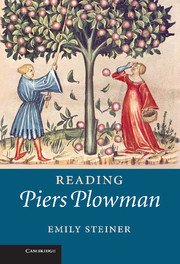1 - Introduction
(Prologue)
Published online by Cambridge University Press: 05 May 2013
Summary
“Thow myghtest bettre meete myst on Malverne Hilles . . .”
(Prol. 215)The poem we call Piers Plowman is testimony to the massive literary output of late fourteenth-century England, the period that produced works as diverse as Troilus and Criseyde, Sir Gawain and the Green Knight, and the English Wycliffite Bible. The reputation of Piers Plowman does not ride on the life of its author, about whom we know little more than what the unique note in Trinity College, Dublin, MS 212 reports, that William of Langland was a son of Stacy de Rokayle, a gentleman dependant of the lords Despenser in Oxfordshire. By contrast, Geoffrey Chaucer’s activities as page, diplomat, and bureaucrat are well known, the translator John Trevisa’s Oxford career can be traced from the 1360s through the 1390s, and John Gower’s tomb can still be visited at his senior residence, St. Mary Overie, Southwark. The Protestant reformer, John Bale, writing the history of English reform, named Robert Langland as the author of Piers Plowman; in his inscription in a Huntington Library manuscript, Hm 128, Bale places the poet at Cleobury Mortimer, not far from the Malvern Hills in south-west Worcestershire, the dialectal region of the poet. However, medieval readers, such as the early fifteenth-century poets who penned Langlandian poems like Pierce the Ploughman’s Crede, were not especially invested in naming an author. They cared about the social imperative embodied by Piers the Plowman, the poem’s critique of the clergy, and its program for spiritual reform.
- Type
- Chapter
- Information
- Reading Piers Plowman , pp. 1 - 20Publisher: Cambridge University PressPrint publication year: 2013

